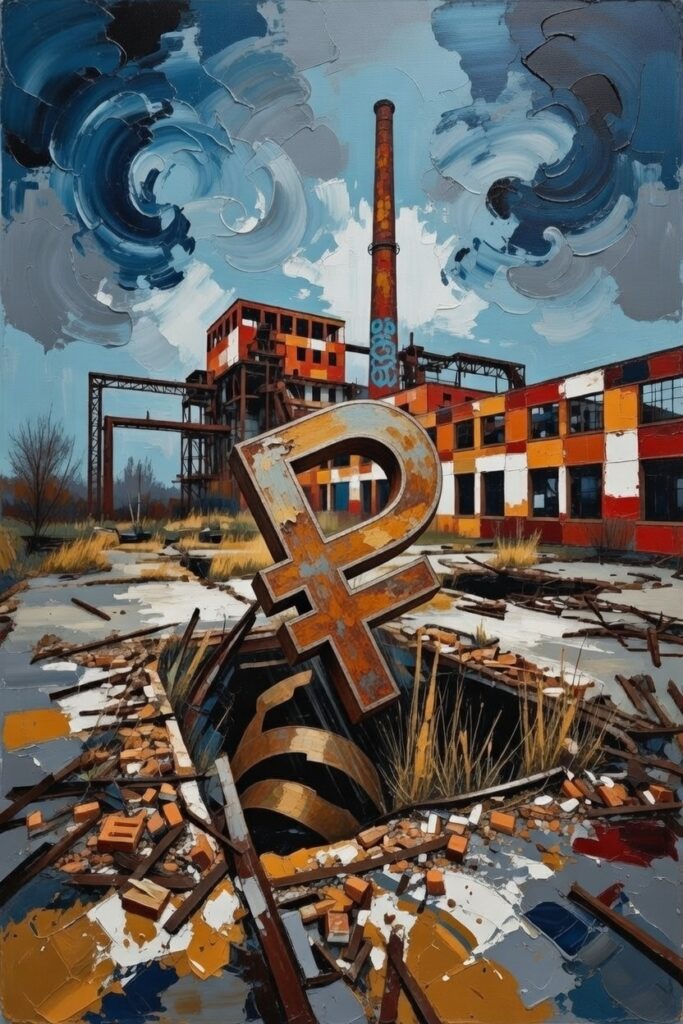It’s official: Reputed outlets are finally acknowledging that the so-called «boom» in Russia is over, though there never was a «boom» in the conventional sense. Policy debates in Moscow have been a perpetual affair since 2011, when Putin formally rejected «unjustified» liberalism and change. Consider a Forbes column by Anton Sviridenko, executive director of the Institute of Economic Growth, warning that declining investment activity will constrain the non-resource economy in 2026−2027, while the resource economy is already in trouble. Last year saw a record decline in business activity in ruble terms, dropping from 25.3 trillion rubles, when defense spending sparked the «boom» in 2023, to 16.7 trillion rubles in 2024. The solution? There is none, beyond vague gestures toward supporting investment and entrepreneurial activity.
Gazprombank’s analysts have concluded that the dynamics driving M2 money supply—a metric favored by Russia’s many monetarists as a proxy for liquid or relatively liquid cash in circulation—are now similar to trends from 2016−2019. Easing financial conditions are supporting business borrowing but have yet to benefit households. Consequently, the monetary factors driving inflation, often framed as «money chasing goods» to justify orthodox policies, resemble the four years of Anton Siluanov’s intense post-Crimea austerity campaign.
Putin has promised that high interest rates «won’t be eternal» due to falling inflation. Perhaps, but stagnation will persist until conditions change. The shifting mood among commentators lags behind reality, as is typical with the wisdom of crowds, but it is well-timed for evidence of a significant shift in the social implications of the war-driven economy. Telegram’s launch of integrated crypto wallets offering 20% yields to hold stablecoins linked to U.S. dollars is a glaring red flag. It signals how desperate people are to protect their earnings from inflation and to speculate outside Moscow’s equity markets, given sanctions and, for many, a sheer lack of wealth limiting access to foreign investments. Why not take the risk? This context informs my thoughts on a post by Jeremy Morris on X, highlighting the hedonistic turn among Russia’s middle class during wartime.
Economic and political economy coverage, both within Russia and by foreign observers, suffers from interrelated biases and blind spots. These gave rise to the «boom» narrative and the often unsatisfying «reasonable» middle ground that things are always better than they seem but worse than they could be. First, there is an ingrained deference to orthodox policy as a virtue in itself, an assumption detached from economic needs and Russians’ lived experiences. Second, consumption is viewed positively despite its frequent threat to the regime’s model of macroeconomic stability. Yet persistent underconsumption is so entrenched in Russia’s model that even marginal increases in private-sector money flows could yield positive outcomes. Third, the structure of consumption—who is consuming and what is being consumed—reveals more than specious polling data from people terrified of speaking honestly or engaged in psychological acrobatics to justify their choices in difficult circumstances. Finally, there is often a gap between reasoning through evidence, sometimes from first principles, and treating the social and institutional context of available data and anecdotes as static.
The stories we tell ourselves are often deceptive, and even when they aren’t, individual gains do not indicate social health. I recall an acquaintance mentioning this summer that a friend from Siberia spoke of pensioners taking jobs in metalworking to support arms plants, driven by the «hot» economy. Assuming this anecdote reflects more than a few cases, we should ask whether a society is healthy when retirees feel compelled to return to work making ammunition or weapons because their pensions cannot keep pace with surging living costs. The Ministry of Economic Development touts a record 6.4 million small businesses and sole traders, with demand for small business registration services up 53%. This sounds positive, but these registrations are occurring as the economy is visibly much weaker than two years ago, suggesting adaptation to growing difficulty relying on larger employers or, in many cases, arbitrage opportunities to profit from the steady decline of public services. I loved the craft brewing boom in the U.S. after the financial crisis, but it reflected millennials’ need to employ themselves amid a confluence of factors, not a roaring recovery.
If demand for tutors in Stavropol is up 111% and 30−80% in third-tier cities or regions outside European Russia, with parents spending 4,000−6,000 rubles a week on their children’s education, why is this a positive sign? Does it indicate that public education and the job market are so challenging that parents fear for their children’s future? Or do they recognize that the quality of classes and education is declining, forcing them to hire tutors to offset the state’s failures? Demand for interior decorators and furniture assemblers has doubled, yet domestic furniture manufacturing has fallen this year. Clearly, something is shifting in how people, particularly the middle class, consume, what they consume, and why.
As Jeremy Morris points out, an intense, depressing hedonism has taken root during wartime—an almost defensive reaction to the venality, brutality, and stupidity of the regime’s prosecution of its war on Ukraine at the nation’s expense. As the public sector faces real-terms spending cuts for the war, loses talent to the war, and becomes increasingly stretched, conspicuous, reckless consumption in private life is the only balm available. Crucially, this is not a society-wide phenomenon. The relatively small increases in the monetary value of imports during the «boom» cannot be explained by Russia’s sudden economic diversification producing competitive consumer goods that can be imported more cheaply from China. Services, being labor-intensive, rely on the very resource the regime is depleting week by week. Paying a tutor to teach your children increases GDP on paper, but it does not suggest that things are going well—or even moderately okay.
Yet I find the notion of hedonistic apathy as a social phenomenon unsatisfying, not for lack of accuracy, but because of its implications. If we take seriously the extent to which the regime has atomized society over the past fifteen years, neutering open political speech and tying the middle class to the mast of the state, we must equally scrutinize what reckless consumption means in a society exhausting its capacity to grow or function. For over three years, regime officials have obsessed over mobilizing Russians’ savings to finance deficits and find workarounds for the fiscal constraints of war and non-war spending. In a society that has abandoned any meaningful concept of a future, what could be more political than denying the regime its last request before it descends into total coercion—to spend entirely for today?










